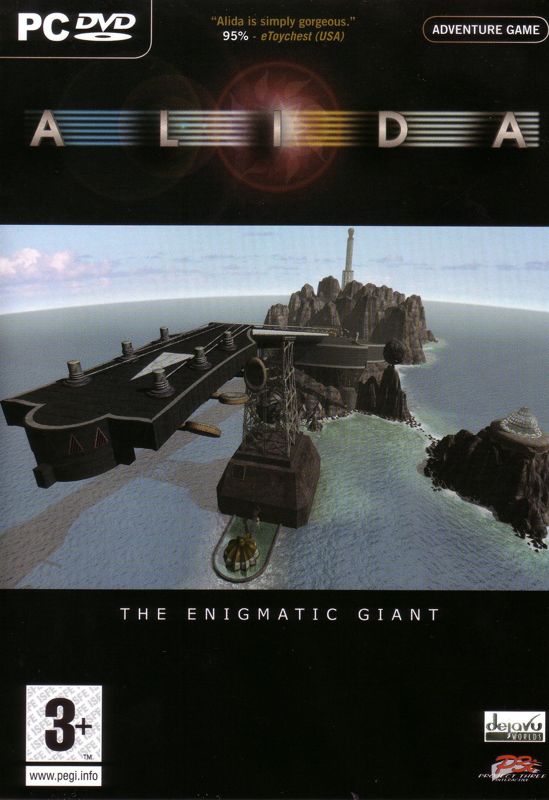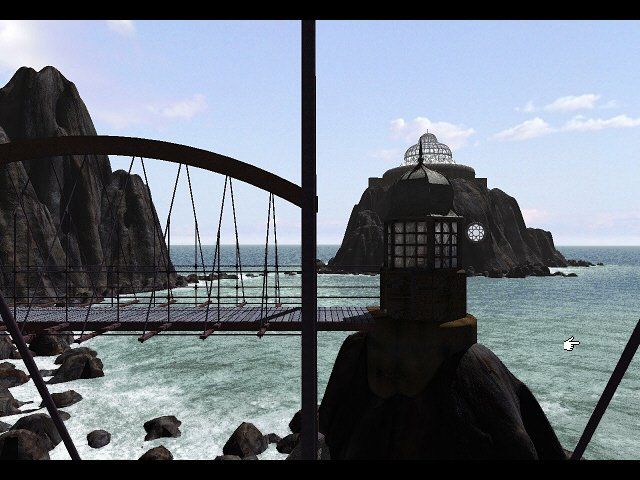Retro Replay Review
Gameplay
Alida’s gameplay is built around first-person exploration and puzzle-solving, drawing clear inspiration from classic titles like Myst. As soon as you set foot on the guitar-shaped island, you’re handed minimal guidance—your curiosity and observational skills are your primary tools. Each area of the island holds musical puzzles of varying difficulty, from simple note-sequence locks to multi-stage contraptions that require careful listening and pattern recognition. The sense of discovery never wanes, as solving one puzzle typically reveals a new section of the island or an unexpected twist in the environment.
(HEY YOU!! We hope you enjoy! We try not to run ads. So basically, this is a very expensive hobby running this site. Please consider joining us for updates, forums, and more. Network w/ us to make some cash or friends while retro gaming, and you can win some free retro games for posting. Okay, carry on 👍)
Movement feels smooth and intuitive, with a straightforward point-and-click interface that keeps the focus on exploration rather than complex controls. Interaction points are clearly highlighted when you’re nearby, yet the puzzles themselves often demand you to wander and experiment. There’s a satisfying “aha” moment every time you crack a particularly devious musical lock or piece together a hidden mechanism. Autosave functionality ensures you can safely step away mid-puzzle, while manual saves let completionists bookmark key milestones in their progress.
One of the game’s strengths is its pacing. Puzzle difficulty ramps up gradually—early challenges serve as tutorials in rhythmic matching or familiar chord progressions, while later tests might combine audio sampling with environmental cues. The island is designed in distinct zones reflecting each band member’s personality, so you’ll revisit concepts in new contexts. Whether you’re decoding a vault’s combination with melodic clues or using found instruments to unlock secret compartments, the gameplay loop remains fresh and engaging throughout your journey.
Graphics
Visually, Alida strikes a balance between stylized artistry and realistic environmental detail. The guitar-shaped island is rendered with lush foliage, rock faces shaped like fretboards, and kelp-choked coves that reflect off crystal-clear waters. Sunlight filters through palm trees, casting dynamic shadows on pathways engraved with musical staff lines. The overall art direction leans slightly toward painterly textures, adding warmth and character rather than chasing photorealism.
Close-up views of the band’s elaborate vaults showcase intricate metalwork, illuminated by neon-like accents that pulse in time with ambient soundscapes. Each vault area is thematically distinct—one member favored bright, carnival-inspired colors, while another’s section feels moody and industrial. Subtle particle effects, like drifting pollen or glowing motes in abandoned recording studios, heighten the sense that this place was once alive with creativity and now stands frozen in time.
Performance across a range of hardware is generally solid, with steady frame rates even when you’re navigating densely vegetated groves or exploring interior caverns lit by bioluminescent mushrooms. Load times between areas are brief, preserving immersion. The seamless transition between outdoor vistas and interior chambers underlines how well the world-building and technical execution work in tandem, ensuring there’s no jarring shift as you traverse from beach to vault room.
Story
The narrative of Alida unfolds gradually through environmental storytelling, journal entries, and cryptic audio logs left behind by the island’s former inhabitants. You learn how the band members, flush with fortune from their debut success, poured their riches into creating this exclusive musical retreat. But after failing to release a second album, their relationships fractured, and each member hoarded their assets in hidden vaults before departing without a word.
Your primary objective—finding Arin—provides emotional stakes that elevate the exploration. Arin’s wife, voice trembling with concern, tasks you with uncovering his fate. As you venture deeper into the island’s secrets, you piece together the band’s unraveling: envy, creative disagreements, and the crushing pressure of fame all played roles. Each discovered note, lyric scrap, or voice recording reveals more of the personal conflicts that led to their disappearance.
The pacing of narrative revelations is expertly handled. You seldom feel overwhelmed by exposition, yet you’re never left ignorant of the island’s backstory. Midway through the game, a pivotal audio diary entry reshapes your understanding of Arin’s motivations, driving you to revisit earlier puzzle sites with fresh eyes. The blend of mystery, regret, and the redemptive power of music infuses the story with genuine emotional resonance.
Overall Experience
Alida is a meditative adventure that rewards patient, inquisitive players. Its harmonious blend of exploratory first-person movement, audio-based puzzles, and atmospheric storytelling crafts a uniquely immersive journey. While fans of high-octane action may find the pace deliberately unhurried, those who appreciate thoughtful world-building and musical riddles will feel right at home.
The game’s production values—rich visuals, dynamic lighting, and a stirring ambient soundtrack—complement the core mechanics, ensuring that every discovery feels significant. Minor hiccups, like occasional texture pop-in or a puzzle that leans heavily on musical theory, are quickly overshadowed by the satisfaction of progressing through beautifully realized island districts. Alida’s strongest appeal lies in its evocative mood and the personal investment you develop in Arin’s story.
In the end, Alida stands as a compelling title for anyone seeking a contemplative puzzle adventure. Its unique setting—a guitar-shaped island with secrets locked behind melodic challenges—offers fresh twists on the genre. Whether you’re a longtime Myst aficionado or a newcomer curious about musical puzzles, this game offers an experience that lingers in your mind long after the final vault door clicks open.
 Retro Replay Retro Replay gaming reviews, news, emulation, geek stuff and more!
Retro Replay Retro Replay gaming reviews, news, emulation, geek stuff and more!









Reviews
There are no reviews yet.